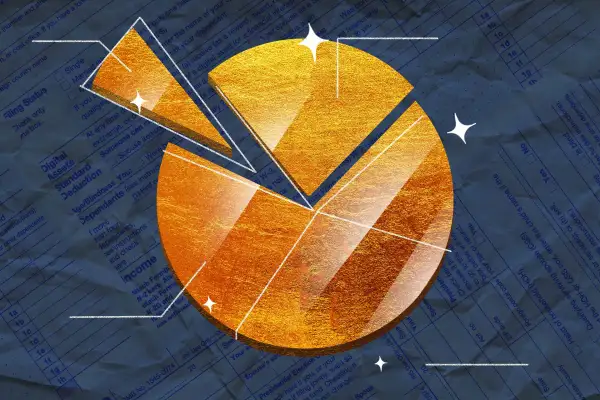How Is Gold Taxed?
Money is not a client of any investment adviser featured on this page. The information provided on this page is for educational purposes only and is not intended as investment advice. Money does not offer advisory services.

Over the past 10 years, the price of gold has more than doubled. Driven by concerns about the economy, fears of market volatility and geopolitical instability, demand for the precious metal has grown significantly with gold investments becoming increasingly popular.
However, if you’re wondering if gold is a good investment, you must first understand that it’s different than investing in traditional securities like stocks or bonds. And one of the key differences is how gold is taxed; if you aren't prepared, those taxes can be a costly surprise.
Types of gold investments
There are many different ways to invest in gold. How gold is taxed depends on the type of investment you choose: physical gold, gold held in an individual retirement account (IRA) — also known as gold IRAs — stocks of gold mining companies, or gold-backed mutual funds or exchange-traded funds (ETFs).
1. Physical gold
When thinking about gold investments, many people’s minds go straight to physical gold coins or gold bars. But physical gold has some unique characteristics in terms of taxation.
When you buy or sell any asset, you have to pay taxes on your profit — the assets' capital gain. However, the Internal Revenue Service (IRS) classifies all gold — including bullion, coins, rounds, bars or ingots — as "collectibles." As such, gold capital gains are taxed at a different rate than other assets.
For gold held for a year or less, you pay the ordinary income tax rate. However, for gold held for longer than a year, it's taxed at the maximum long-term capital gains rate of 28%.
If you make less than $182,100 per year as a single taxpayer, that tax rate means you're paying a higher-than-usual rate on your capital gains. By contrast, high-income individuals in higher tax brackets can actually take advantage of this tax rate; 28% is lower than they would pay on their income.
Your capital gains on gold must be reported on Form 8949, Sales and Other Dispositions of Capital Assets, for the tax year in which you sold your physical gold.
2. Gold IRAs
Gold held in an IRA is taxed quite differently than physical gold you possess yourself. That’s because gold IRAs are a type of self-directed IRA — or SDIRA — that allows account holders to invest in alternative assets like gold and other precious metals.
To qualify, the gold in the IRA must meet the IRS' purity standards, and the gold must be held by an authorized storage facility, such as an approved depository.
Gold IRAs have the same tax benefits as regular IRAs. Companies providing the best gold IRAs typically offer both traditional and Roth options:
- Traditional gold IRA: With a traditional gold IRA, you contribute with pre-tax dollars, and the holdings can grow on a tax-deferred basis. Once you make withdrawals in retirement — assuming you're 59.5 years old or older — you're taxed at your ordinary income tax rate. If you withdraw money before that age, you'll pay the income tax rate as well as a 10% penalty.
- Roth gold IRA: Roth IRAs allow you to make contributions with post-tax dollars. Therefore, once you reach your retirement age, you can take distributions tax-free.
Traditional gold IRAs are subject to required minimum distributions (RMDs), meaning you have to withdraw a certain amount per year from your account once you reach your 73rd birthday.
Additionally, SDIRAs — such as gold IRAs — count towards the annual IRA contribution limit. So if you have a traditional IRA with a brokerage, be mindful that a gold IRA will also count towards the yearly cap. For 2025, the annual contribution limit for IRAs is $7,000 for those under the age of 50, or $8,000 for those 50 or older.
3. Stocks, mutual funds and ETFs in brokerage accounts
Another option is to invest in gold by investing in related stocks, mutual funds and gold ETFs. These options allow you to invest in companies like precious metal mining corporations and technology firms that utilize gold. You can invest in stocks, mutual funds and ETFs in retirement accounts or brokerage accounts.
With a brokerage account, you have to pay taxes when you sell your holdings at a profit, earn interest payments or receive dividends. The money in your account is taxed during the year it's earned (not when you take a withdrawal).
How long you've held onto the asset affects your tax rate. For long-term capital gains, you'll be taxed at 0%, 15% or 20% depending on your income. For short-term capital gains, you'll pay your ordinary income tax rate — between 10% and 37%.
Minimizing taxes on gold investments
While gold is taxed in a variety of ways depending on the type of investment, there are a few strategies you can use to minimize your tax liability.
Hold for the long-term
The biggest tax charges are applied to short-term gold investments. If possible, hold onto your gold for at least a full year to avoid having to pay short-term capital gains taxes.
Use tax-advantaged accounts
Taxable brokerage accounts and physical gold investments don't have any tax benefits. However, gold IRAs do. Depending on the type of IRA you choose, you could qualify for benefits like tax-deferred growth or tax-free withdrawals in retirement.
Consult a tax professional
To ensure you're prepared for tax season (and long-term tax planning) consult with a tax professional, such as a certified public accountant (CPA). A CPA can review your options with you and help you choose the right accounts to optimize your tax strategy.
